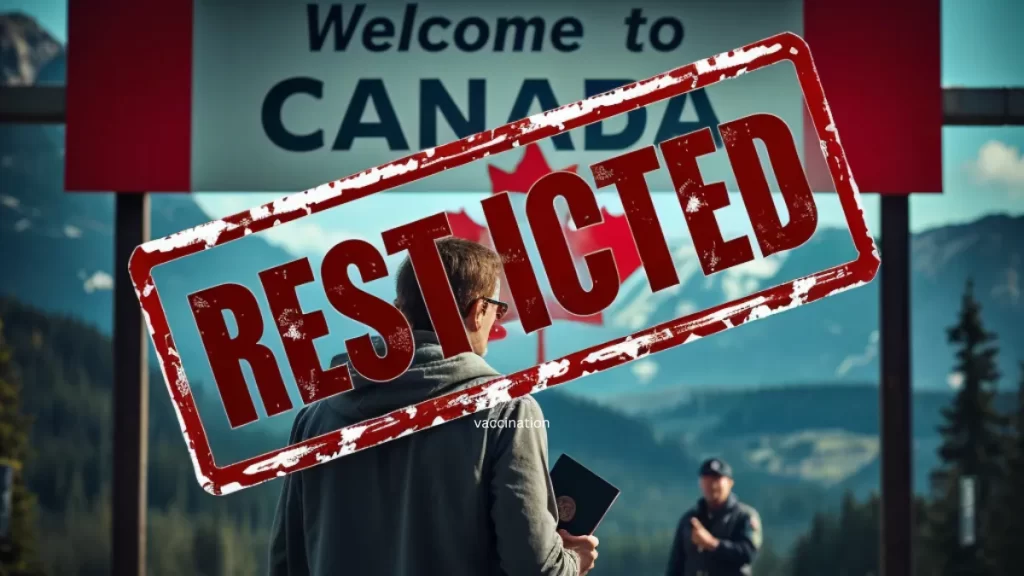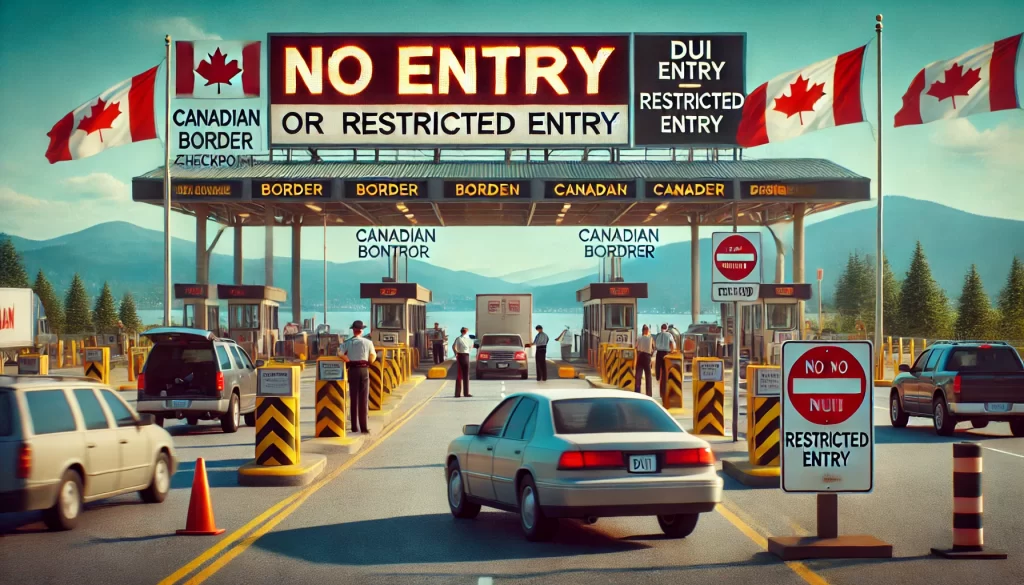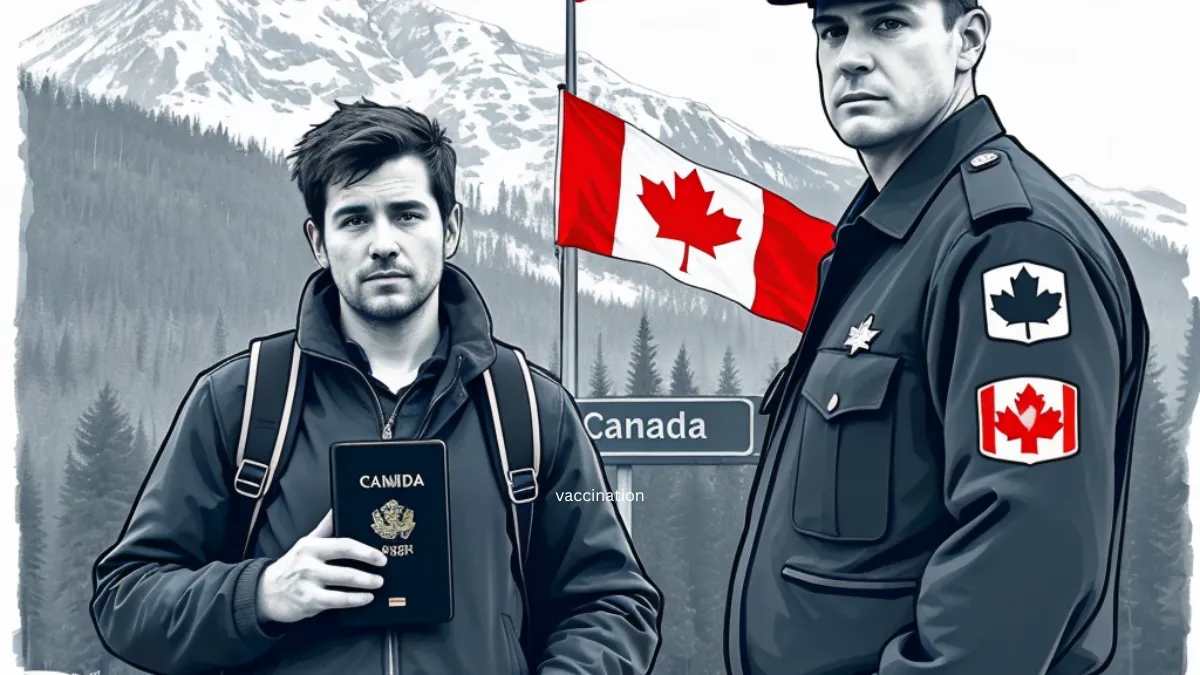Table of Contents
Can you go to Canada with a DUI? or try to enter Canada more often than you might imagine, this is a question. Having a conviction for DUI (driving under the influence) can create significant concerns, especially when planning to travel internationally. In this article, we’ll uncover the shocking truth and exciting updates about whether you can enter Canada with a DUI.
Can you Enter Canada 10 Years after your DUI Conviction?
Entering Canada with a DUI conviction, even one from over a decade ago can be challenging due to Canada’s strict immigration laws. In December 2018, Canada reclassified DUI offenses as serious criminality, increasing the maximum penalty from 5 to 10 years in prison. This change means that individuals with DUI charges or convictions are considered criminally inadmissible, regardless of how much time has passed.
Previously, individuals with a single DUI conviction could be deemed rehabilitated after 10 years, allowing entry without special permission. However, this automatic rehabilitation no longer applies under the current law for those convicted outside Canada. To enter Canada, you must apply for Criminal Rehabilitation, provided at least five years have passed since the completion of your sentence. This application is a permanent solution, removing the inadmissibility if approved.
Alternatively, if you have a compelling reason to enter Canada, and it’s been less than five years since completing your sentence, you can apply for a Temporary Resident Permit (TRP). A TRP allows temporary entry despite inadmissibility but is granted at the discretion of Canadian immigration authorities and typically requires a strong justification.
It’s important to note that even with a DUI conviction from over 10 years ago, you are not automatically admissible to Canada for entry into Canada. It would help if you went through the appropriate legal channels to overcome inadmissibility. Consulting with an immigration lawyer can help navigate this complex process and increase the likelihood of a successful application.
Can You Go to Canada with a DUI? What Happens If You Have a DUI and Want to Enter Canada?
Canada considers certain offenses, such as a DUI charge, to make a person inadmissible to Canada. You may face inadmissibility to Canada if you have an old DUI, a misdemeanor DUI conviction, or a DUI on your record. Americans with a DUI, even those with A prior DUI conviction can complicate your ability to travel to Canada with DUI charges on your record or a DUI arrest or conviction, may struggle to get into Canada. While some may fly into Canada, others may be allowed entry to Canada if they meet specific criteria or have their visa approved. Does this mean a us citizen will never visit? There are legal pathways for drug charges or convictions, but it’s not guaranteed.
Why is DUI Considered a Serious Crime in Canada?
Under Canadian law, a dui or dwi is considered severe criminality in Canada. This can be daunting, making many individuals reconsider their plans for entering the country, criminally inadmissible to Canada. Americans with a DUI are traveling to Canada for work or Planning a trip to Canada.
Requires careful consideration if you have a DUI in Canada or the USA. Canada may face hurdles due to the equivalent crime in Canada classification. Even a Dui arrest with no conviction can lead to being denied the ability to enter Canada and considered inadmissible to Canada. For people with a dui, the focus is on public safety, as impaired driving can pose risks. Whether it’s a need to enter Canada or a trip to Canada, it is essential to understand the implications of a DUI conviction. A reckless driving conviction or driving under the influence may impact your ability to enter Canada these offenses are flagged for potential travelers.
Can a DUI Keep You Out of Canada? Exploring Legal Options
While Canada is strict on DUI offenses, it doesn’t mean you’re permanently banned from visiting Canada with a DUI. Fortunately, there are legal pathways you can explore to gain entry potentially.
Temporary Resident Permit (TRP)
Those who have been convicted of DUI may choose to seek a Temporary Resident Permit (TRP). With this permit, you can go to Canada for a purpose, like seeing relatives or going to business. However, obtaining a TRP requires proving that your visit is justified and you pose no threat to Canadian society.
TRPs are issued for a limited time, and the decision is at the discretion of Canadian immigration authorities. A TRP can be denied, but it offers a glimmer of hope for those seeking temporary access to Canada with DUI charges.
Criminal Rehabilitation
Another legal option for those attempting to enter Canada is applying for Criminal Rehabilitation. This process allows individuals with a DUI conviction to be considered rehabilitated, meaning they’re no longer deemed inadmissible if five years have passed since you may apply for criminal rehabilitation after serving out the entirety of your DUI sentence, which includes any fines, probation, or other consequences.
If approved, you could enter Canada without applying for a TRP each time. This is a more permanent solution, allowing you to travel to Canada as you would without the DUI conviction hanging over your head.
Can you go to Canada with a DUI? How Long After a DUI Can You Enter Canada?
Many people wonder how long they have to wait after a DUI conviction before they can enter Canada. The timeline depends on several factors. As mentioned earlier, you may be eligible for Criminal Rehabilitation after five years. However, if it’s been more than ten years since your DUI conviction and you haven’t had any further offenses, you might be deemed rehabilitated automatically.
This “deemed rehabilitation” allows you to enter Canada without applying for a TRP or Criminal Rehabilitation. It’s important to note that this applies only to single DUI offenses. Multiple convictions or more serious criminal records may require additional legal procedures.
Can you go to Canada with a DUI? The Impact of a DUI on Entry to Canada: What You Should Know

The process for entering Canada with a DUI varies depending on your situation. These are essential things to keep in mind.
Factors That Affect Your Eligibility
- Time Since Conviction: Those convicted outside Canada five years ago may be eligible for entry.: If it’s been over ten years and there are no further offenses, you may qualify for deemed Rehabilitation.
- The severity of Offense: A more severe DUI (such as one resulting in injury or property damage) may require more extensive legal processes when attempting to enter Canada.
- Purpose of Travel: Your reason for visiting Canada can affect your eligibility. For instance, emergency travel may sometimes lead to more lenient decisions.
Can you go to Canada with a DUI? Understanding Border Control’s Role
Canadian border officers have the final say regarding allowing you into the country. Even if you’ve taken all the necessary steps, they may still deny entry if they believe you pose a risk to the government of Canada. Being prepared, having the proper documentation, and being honest during questioning is crucial to maximizing your entry chances.
Also Read: Travelers Tree: Unveiling Nature’s Hidden Paradise Awaits
Possible Solutions for Canada DUI Entry
- Criminal Rehabilitation Application
- This is a permanent solution for overcoming Canada DUI entry These restrictions can significantly impact your ability to travel to Canada with DUI. To qualify, at least five years must have passed since the completion of your sentence, including any fines or probation related to your DUI in the USA. Approval removes your criminally inadmissible to Canada status, allowing unrestricted entry.
- Temporary Resident Permit (TRP)
- A TRP offers temporary entry despite inadmissibility to Canada. This solution is ideal for urgent travel, such as a trip to Canada Many people seek to enter the country for work or family reasons despite their past DUI offenses. It requires a strong justification and is issued at the discretion of Canadian authorities.
- Deemed Rehabilitation
- Although the automatically deemed rehabilitation process no longer applies after 10 years, travelers with a past DUI conviction or DUI arrest can explore this option. Consulting legal experts helps determine if your case meets the criteria for deemed rehabilitation under Canadian law.
- Legal Advice and Documentation
- Working with an immigration lawyer familiar with DUI laws and Canadian DUI entry processes is essential. They can assist in collecting required documents, such as proof of DUI arrest or conviction or the completion of penalties, in building a solid application.
- Special Cases
- If your offense was a misdemeanor DUI conviction or occurred years ago, and you are an American with a DUI, you may still have a chance to gain admissible to Canada status through proper channels. Unique circumstances like a prior DUI conviction or multiple offenses may require additional steps.
- Prepare Ahead of Time
- Plan for delays, as the application process can take months. Whether applying for rehabilitation or a TRP, ensure you meet the eligibility criteria and provide comprehensive records.
By utilizing these legal pathways, individuals with a DUI on their record can explore options to become permitted to enter Canada and Avoid being considered severe criminality in Canada, denied entry to Canada.
Can you go to Canada with a DUI? Latest Updates on DUI and Travel to Canada

In recent years, Canada has updated its immigration policies concerning individuals with DUI convictions. These changes are essential to know before making travel plans. One of the most significant updates is the shift toward stricter enforcement, especially after Canada passed Bill C-46 in 2018. This law increased the maximum penalties for DUI offenses, further complicating the entry process for those with DUI records.
The Canadian government has yet to show signs of relaxing these rules. However, the good news is that legal pathways, such as TRP and Criminal Rehabilitation, still exist to help travelers with DUI convictions.



